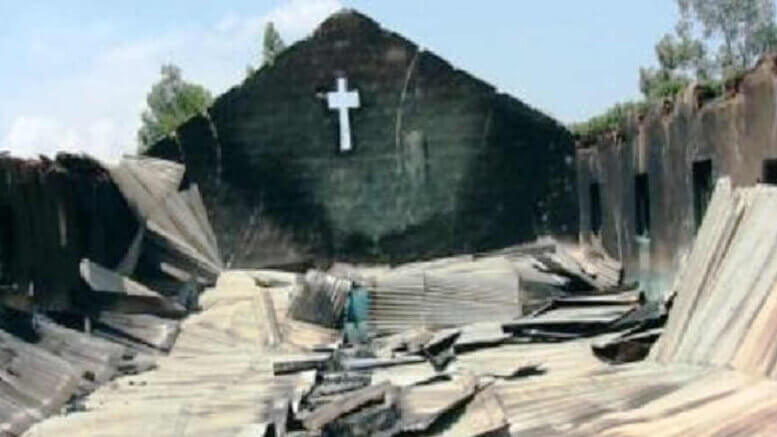The following are among the abuses Muslims inflicted on Christians throughout the month of September, 2020:
The Slaughter of Christians
Italy: On September 15, an illegal Muslim migrant repeatedly stabbed a Catholic priest with a butcher’s knife, finally killing him with a stab to the neck. “The priest died like a dog, that was right,” Tunisian citizen Mahmoudi Ridha, 53, later boasted after slaughtering Fr. Roberto Malgesini, 51. According to the Church Militant report, the priest “knew his murderer and had helped him out on a number of occasions … but the Muslim still considered the priest his enemy,” and may have killed him due to suspicions that the clergyman was “part of a plot to deport him.” Although the diocese of Como, where the crime occurred, and the nation’s mainstream media initially reported that the murderer had a long history of mental illness, a series of tests later confirmed that no “certified psychological problems” were evident.
Responding to this, Silvana De Mari, an outspoken pro-life doctor, openly condemned Pope Francis’s “exhortation to build bridges, not walls” as “absolute idiocy,” adding, “If a European kills a non-European he’s a murderous pig, a Nazi and above all, always responsible for his actions. If the opposite happens, he’s just a bit touched in the head.” The murder sparked tension between locals and migrants—including a fistfight between an Italian woman and a young African male. Discussing the North African homeland of the murderer, an independent consultant on the global persecution of Christians said: “Despite Tunisia being a resort visited by many Western tourists, under the surface there is a darker side where Christians are often despised and abused by Muslims. It can take a considerable amount of Christian love and compassion to dislodge such attitudes that have often become deeply ingrained.” This incident is not singular. According to the report,
In 2016, 65-year-old Belgian priest Fr. Jos Vanderlee was stabbed by a Muslim asylum-seeker in his vicarage after he offered a shower and hospitality to the migrant. The incident took place six days after elderly Fr. Jacques Hamel had his throat cut by Islamic terrorists in the rural French town of St-Étienne-du-Rouvray, near Rouen, in Normandy. In 1999, a North African Muslim immigrant killed Fr. Renzo Beretta, parish priest of Ponte Chiasso, after turning to him for help.
Uganda: A Muslim “witch doctor” ritually slaughtered the 11-year-old son and sexually enslaved the 13-year-old daughter of a convert to Christianity. The story came out on September 16, when the slain boy’s sister was found and rescued by police. Both children were abducted and sold to the shamanist by a Muslim woman opposed to their father’s conversion to Christianity. “We are mourning for our son who is alleged to have been sacrificed,” Sulaiman Pulisi, a former imam who embraced Christ three years ago, said. “We are mourning with my daughter, who has been used as a sex object by the Muslim shaman.” Joseph Sodo, a Christian shopkeeper instrumental in the girl’s rescue, offered more details:
A radical Muslim woman called Sania Muhammad who had connections with Muslim men used to look for children of converts from Islam and sell them to this particular Muslim witchdoctor … named Isifu Abdullah, who makes use of amulets and charms inscribed with verses of the Koran in warding off evil forces.
Democratic Republic of Congo: A total of at least 58 people were slaughtered and 17 kidnapped during a suspected Islamic terror attack on two Christian majority villages, one on September 8, another on September 10. Countless others were displaced into the heavily forested area. “People were killed with every sort of weapon, knives, guns,” a local explained, adding that the army and volunteers were “still looking for victims in the forest.” According to another report,
Members of the Allied Democratic Forces (ADF), an Islamist militant group active in the region for more than two decades, are thought to have carried out the atrocity…. In May, at least 57 people from two villages in Ituri were murdered by the jihadists in attacks on consecutive days. More than 700 people have been killed in Ituri province since 2017…
Nigeria: Minutes before another Fulani Muslim herdsmen raid was launched on a Christian village, Alubara Audu, a pastor who was earlier wounded in a similar attack, sacrificed his life to save those of his community. On Sunday, September 6, around 2 a.m., he heard the jihadists creeping towards his village and instantly raised the alarm, prompting several Christians to escape. He, however, was shot by the angered terrorists. While wounded and bleeding on the floor he continued sounding the alarm for more villagers to flee, prompting the Muslims to shoot him multiple times, till he was permanently silenced. The pastor leaves behind a wife and four children. Two other Christians were killed during the raid, and two more abducted.
Among the dozens of other Christians to be killed by Muslim Fulani herdsmen in September were two young Christian girls and a 6-year-old boy (September 28); a 64-year-old Christian community leader and seven other Christians (September 21); a Christian woman and her son as they were working on their farm (September 23); and five other Christians (September 24).
Discussing the plight of Nigerian Christians in a September 16 statement, the Catholic bishops of Kaduna Province said that “dark clouds of violence have enveloped our land. Our country is in the firm grip of the grim reaper.” For over a decade, Nigeria’s main challenge was the Islamic terrorist group Boko Haram, the statement said, though the military had largely degraded two years ago:
But our joy was short lived as the story has progressively gotten far worse. Today, almost the entire northern states are in the grip of these purveyors of violence and death. In the last three years, we have witnessed the relentless attacks and ransacking of entire communities… Thousands of lives have been lost to these bandits who have operated with relentless abandon…. The ravages of Boko Haram, the [Muslim Fulani] herdsmen, kidnappers and the bandits have turned everyone into a victim.
Fr. Sam Ebute, who serves one of the persecuted communities, gave a more personalized take:
For four years, since I became a priest in 2016, I have been burying my parishioners. In 2017, I had to bury a woman who had been killed along with her four children at night, in Tachira. In 2018, in Tsonje, the parish had to also bury four people who were killed. In 2019, in Zunruk, seven youths were killed in broad day light while playing soccer.
More recently, in late July of this year, Fr. Sam buried 21 other Christians from his flock, most of them young girls:
So, for the past seven weeks, we have been burying our parishioners with no end in sight. These last attacks have left us all in fear and especially the fear of the unknown because we do not know when the next round of attacks will happen and what will trigger it. We cannot worship in peace…. Our movements are limited, our faithful cannot freely go about their activities. It is farming season now, but they dare not go to their farms for fear of being attacked there. They have left their crops to perish. It is like we have been left to perish because of our faith.
Pakistan: A Lahore court sentenced a Christian man who had already served seven years in prison to death on a “blasphemy” conviction. Asif Pervaiz, a 37-year-old father of four, was originally arrested in 2013, when his Muslim supervisor at the garment factory he worked for first accused Pervaiz of sending offensive remarks about Islam’s prophet, Muhammad, in a text message. During his September 8 hearing, the judge ruled that Pervaiz must pay an additional fine of 50,000 Pakistani rupees (USD $305) and serve a three-year prison term for “misusing” his phone. Afterwards, and according to the ruling, the Christian blasphemer “shall be hanged by his neck till his death.” The condemned, however, denies all charges. “In his statement to the court, Pervaiz had categorically said that the complainant used to pressure him to renounce his Christian faith and convert to Islam,” Saiful Malook, the Christian’s lawyer, explained: “Pervaiz said that due to the complainant’s constant harassment, he was forced to leave his job at the factory, but the latter continued to hound him at his new workplace.” The lawyer, who is appealing the verdict in the Lahore High Court also cited a number of irregularities that should have rendered evidence against his client inadmissible:
This case should have been thrown out by the judge…. Although I’m greatly disappointed by the ruling in this case, one cannot ignore the fact that it has become a norm of trial court judges hearing blasphemy cases to convict the accused no matter how weak the prosecution’s case is…. It’s tragic that Pervaiz has already spent seven years in prison during the trial, and God knows how many more years he will have to remain incarcerated till the high court takes up his appeal. The worst thing in blasphemy cases is that the accused are left to rot in jail for years till their innocence is finally proved.
According to a separate report discussing Pervaiz’s case,
Human rights groups say blasphemy laws are often misused to persecute minorities… Such accusations can end up in lynchings or street vigilantism. Up to 80 people are known to be imprisoned in the country on such charges — half of whom face life in prison or the death penalty… In July, a US citizen of Pakistani origin on trial over blasphemy allegations in Peshawar was shot dead in a courtroom by a teenager who told bystanders he killed him for insulting the Prophet Muhammad. Since his arrest, the alleged shooter has been glorified as a “holy warrior” by supporters and thousands of people have rallied to demand his release.
Attacks on Churches
Turkey: On September 2, Turkish authorities razed to the ground the St. Georgios Christian church, a historic and iconic structure built in 1896 and known as the “Hagia Sophia of Bursa.” In 2006, after the municipality had spent two million Turkish liras (USD 252,000) on renovations, the dilapidated building was restored and transformed into a cultural center. But then, in 2013, an Islamic foundation filed a lawsuit against and eventually appropriated the church. Then, according to the report,
The historical building, whose door was locked after passing to the [Islamic] foundation, was not maintained for years, and cracks began to appear in the building. Noting the situation … and drawing attention to the danger of demolition, Nilüfer Municipality attempted again in 2016 to control the church and demanded that the building be allocated to the municipality for renovation. However, it was stated that the building cannot be used for any purpose other than a place of worship and that this place was a mosque.
The building continued to deteriorate until September 2, when it was demolished as a public hazard. Commenting on this development, Nilüfer Mayor Turgay Erdem said:
We have done our part to pass on a cultural heritage to future generations. However, the [Islamic] Foundations have taken away the historical structure in a meaningless way. And left [it] to rot. For 7 years, nobody claimed this structure. Public money was wasted because of this negligence. Who will account for this?
In a separate incident, a wall sealing off both entrances of a Greek Orthodox Church in Tralleis was illegally erected by unknown persons, although there are suspicions that the Didima Municipality erected it as a way to justify issuing alcohol licenses to local restaurants. The current law states that alcohol cannot be sold within 328 feet of a religious building. As this law was made with mosques in mind, some resent that a mere church is preventing their sales of alcohol.
Attacks on Crosses
Sweden: A little Swedish boy was called a “pig bastard” and beaten by a Muslim migrant gang for wearing a crucifix. The incident occurred in Malmö, which has a large Muslim population and is known as the “rape capital” of Sweden. According to the September 1 report, an “unknown number of boys” approached the 11-year-old child, who was playing soccer during lunch break, and asked if he was wearing the cross “due to his religion.” After he responded in the affirmative, the gang asked if he also “ate pig”—before immediately calling him a “pig bastard” and knocking him over, injuring the boy’s arm. He managed to run away but not before they stole his ball and shoes. “Police had not yet arrested any perpetrator. Hate crime motives are suspected,” the report adds.
Greece/Turkey: Because it is visible in Turkey’s city of Edirne, a 50-foot high cross recently erected at Greece’s Holy Monastery of Agia Skepivis provoked President Erdoğan enough to complain about it to German Chancellor Angela Merkel, whom he was scheduled to meet later that week, according to a September 21 report. Discussing this same incident, a separate report states that,
Erdoğan’s reaction to the establishment of a cross within Greek territory sets the foundation for increased religious persecution within Turkey. He is growing hostility towards Christian symbols. Christianity is already greatly struggling to exist within Turkey, and this kind of hostility reinforces the idea that Christianity is not welcome within its borders.
Pakistan: Muslims ransacked a Christian barbershop for displaying a cross and other Christian symbols. According to a September 2 report, a group of Muslims entered the store and began to abuse the owners for hanging a cross on the front wall as well as having the biblical verse “My grace is sufficient for you” (2 Cor. 12:19). The Muslims “told us to remove the Christian symbols from the shop because Muslim customers did not feel comfortable,” the owners explained. “However, we ignored this demand.” On the next day, more than a dozen men wielding iron rods pulverized the store, damaging its glass door, mirrors, shelves, cupboards, and other equipment. “They also beat staff and looted cash and other expensive stuff from the shop,” the owners said. Then, before they could report the incident to police, police arrested one of the owners on the accusation that he was evangelizing to Muslims. Although he was released on the following day, “Our business is stopped and we are worried for our daily bread,” the owners said. “This is a very intolerant society. Christians are not accepted when running successful businesses and enjoying leading positions. This discrimination has to be ended.”
General Discrimination against Christians
Iran: On September 22, a Christian couple, both former Muslims who were earlier persecuted and imprisoned by authorities of the Islamic Republic, lost their appeal to retain custody of their one-year-old adopted daughter—“and for one reason” only, says the report: “they are Christian converts, and Lydia, though her parentage is not known, is considered a Muslim, and as such by law ought only to be cared for by Muslim parents.” The ruling was made despite the fact that the judge himself acknowledged the child’s “intense emotional attachment” to her adoptive parents and that there was “zero chance” another adoptive family would be found for her, including because the 1-year-old suffers from heart disease.
Pakistan: In an interview, a Christian man who was rounded up with dozens of other Christians and imprisoned after two Muslim men were killed in riots surrounding the suicide bombing of two churches and killing of 20 Christians in 2015, explained the deciding factor over who was imprisoned and who was not. According to Amjar Arif,
Police said, if we didn’t convert to Islam we’d face prison…. At the police station, officers abused, slapped and tortured us with batons, charging us with burning Muslims…. They snatched rosaries from three of us and threw them on the floor. We were forced to accept either Islam or guilt in the murder of two men…. A 25-year-old Christian, also arrested for alleged lynching, converted to Islam and was released three hours later. We kept our faith in the living God… we used to pray in a circle for an hour. In the evening we had dedicated 8pm personal prayers…Two of us died in that prison.
Amjar Arif was released five years later.
Sexual and Psychological Abuse of Christian Women
Egypt: Once again, a court involved in the case of the unconscionable abuse of an elderly Christian woman recused itself. “The case had been postponed several times and was closed in 2017 due to insufficient evidence,” says the September 3, 2020 report. “However, the woman’s legal representatives filed a grievance reopening it again. Then, in March 2019, the Minya felony court decided to withdraw from hearing the case due to embarrassment.” After that, in October 2019, the case was postponed again, because a court member was reportedly absent; and now this. The case concerns Soa‘d Thabet, a Christian grandmother in her 70s. On May 20, 2016, a mob of some 300 Muslim men, accusing her son of dating a Muslim woman, descended on her home, stripped her completely naked, beat, spit on, and paraded her in the streets of al-Karm village (in Minya governorate) to jeers, whistles, and triumphant shouts of “Allahu Akbar.” Commenting on these ongoing delays, Adel Guindy, founding president of Coptic Solidarity, told Gatestone,
The judiciary system in Egypt, as well as the rest of the pillars of the state (often referred to as the “deep state”) have become impregnated with fundamentalist Islamic ideology, and are thus decidedly biased against Copts. The political leadership of the country takes no concrete corrective measures and, worse still, lets this ideology shape and dominate the society, through education and media.
Separately, according to a September 10 Coptic Solidarity report, the kidnapping, sexual abuse, and forced conversion of Christian women and girls in Egypt—a “particularly vulnerable group to exploitation” that is quietly living an “unimaginable nightmare”—is rampant with no signs of abatement. The 15-page report documents “the widespread practice of abduction and trafficking” and estimates that there have been “about 500 cases within the last decade, where elements of coercion were used that amount to trafficking.” It adds that:
The capture and disappearance of Coptic women and minor girls is a bane of the Coptic community in Egypt, yet little has been done to address this scourge by the Egyptian or foreign governments, NGOs, or international bodies. According to a priest in the Minya Governorate, at least 15 girls go missing every year in his area alone. His own daughter was nearly kidnapped had he not been able to intervene in time…. The large majority of these women are never reunited with their families or friends because police response in Egypt is dismissive and corrupt. There are countless families who report that police have either been complicit in the kidnapping or at the very least bribed into silence. If there is any hope for Coptic women in Egypt to have a merely ‘primitive’ level of equality, these incidents of trafficking must cease, and the perpetrators must be held accountable by the judiciary.
Pakistan: A 6-year-old Christian girl was “beaten and raped after being forcibly taken to the home of a Muslim rapist in broad daylight,” says a September 16 report. Moreover, and “in a sickening twist,”
the local Muslim community are threatening the Christian parents with violence, the rape of their other daughters and financial ruin if they proceed with a legal case against paedophile Muhammad Waqas (18 yrs)… Tabitha [the raped child] had been verbally abused, shouted at, slapped and beaten and forced to do a number of sex acts with Waqas. She had been stripped of her clothes and had described her terror that she would be killed by Waqas…
Although various societal elements pressured her family to drop the case against the Muslim rapist and accept a financial settlement, her parents refused, demanding justice. As a result, two imams from local mosques warned Munir Masih, the girl’s father, that “we shall burn your house and take away your other daughters too, if you fail to comply.” He responded by gathering his family and fleeing to an undisclosed location in the middle of the night. Although evidence for the case “was strong with eye witnesses” and included “a medical examiner who found evidence of rape and brutality and a positive match on DNA tracing with that of Waqas” — and despite the family’s perseverance for justice — the court granted the rapist bail. “Tears rolled from the eyes of Munir while I hugged him in the yard of Lahore High Courts,” a legal representative of the family explained. “The paedophile rapist who had sexually assaulted his daughter on many counts was granted bail and it caused him intense pain. It was excruciating for him to see the rapist of his tender-aged daughter released—I felt broken myself.”
In a separate incident, on September 8, Mehwish Hidayat, a 22-year-old Christian girl, managed to escape from her Muslim abductor/rapist, Khurram Shehzad, and reach her parents’ home. According to the girl, she was kidnapped on June 3:
It was around 7:30 in the morning when I left for the garment factory. I was waiting for my bus along with six to eight girls. Suddenly, two armed men appeared from a white car. They showed their guns and warned everyone not to interfere. The kidnappers then dragged me into the car. All the other girls started shouting, but none of them was in a position to save me as the kidnappers threatened them with their guns… For three months Shehzad [her “owner”] kept shifting from one city to another and sexually assaulted me. He often tortured me for refusing to sign the conversion and marriage certificate. He forced me to recite Islamic proclamations and verses. However, I remained committed to my Christian faith.
Although she has rejoined her family, “our lives will always be in danger,” she said. “My family is continuously receiving threats from Shehzad.”
Raymond Ibrahim, author of Crucified Again and Sword and Scimitar, is a Distinguished Senior Fellow at the Gatestone Institute, a Shillman Fellow at the David Horowitz Freedom Center, and a Judith Rosen Friedman Fellow at the Middle East Forum.
About this Series
The persecution of Christians in the Islamic world has become endemic. Accordingly, “Muslim Persecution of Christians” was developed in 2011 to collate some—by no means all—of the instances of persecution that occur or are reported each month. It serves two purposes:
1) To document that which the mainstream media does not: the habitual, if not chronic, persecution of Christians.
2) To show that such persecution is not “random,” but systematic and interrelated—that it is rooted in a worldview inspired by Islamic Sharia.
Accordingly, whatever the anecdote of persecution, it typically fits under a specific theme, including hatred for churches and other Christian symbols; apostasy, blasphemy, and proselytism laws that criminalize and sometimes punish with death those who “offend” Islam; sexual abuse of Christian women; forced conversions to Islam; theft and plunder in lieu of jizya (financial tribute expected from non-Muslims); overall expectations for Christians to behave like cowed dhimmis, or second-class, “tolerated” citizens; and simple violence and murder. Sometimes it is a combination thereof.
Because these accounts of persecution span different ethnicities, languages, and locales—from Morocco in the West, to Indonesia in the East—it should be clear that one thing alone binds them: Islam—whether the strict application of Islamic Sharia law, or the supremacist culture born of it.
SOURCE: RAYMOND IBRAHIM





